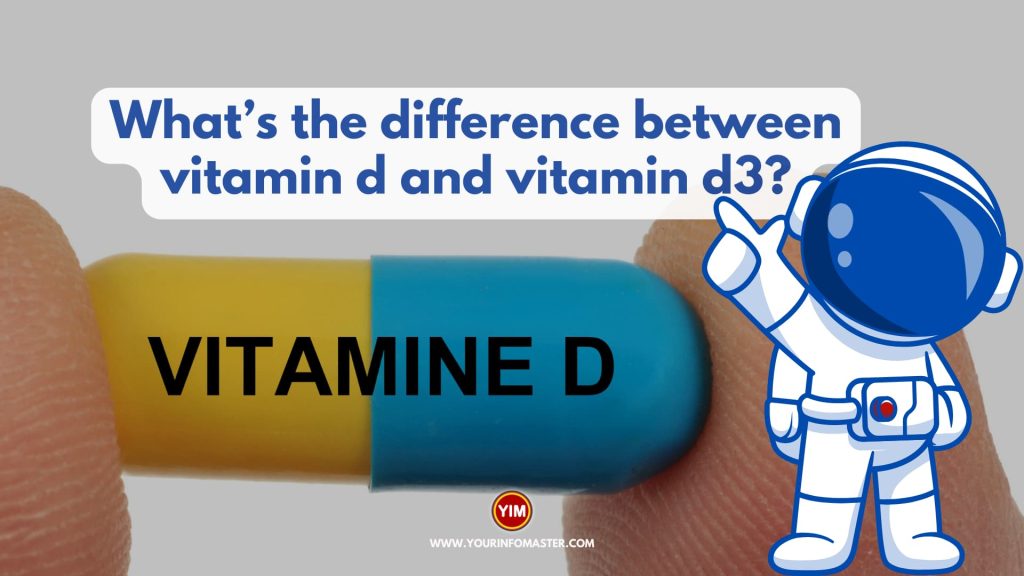I am going to explain the blog post “What’s the difference between vitamin d and vitamin d3?“
Are you confused about the difference between Vitamin D and Vitamin D3? You’re not alone! While both are essential for bone health, they have some key differences that may impact your health. In this blog post, we’ll explore the 10 main differences between Vitamin D and Vitamin D3, helping you make informed decisions about your vitamin intake.
Check also: What is the difference between a Chromebook and a Laptop?
Check also: Water Intake Calculator
10 Differences between vitamin d and vitamin d3
Here is a list of 10 differences between vitamin d and vitamin d3:
- Source
- Absorption
- Conversion
- Dosage
- Half-life
- Storage
- Effectiveness
- Deficiency symptoms
- Side effects
- Price
Check also: What is the difference between right and left Twix?
Let’s dive into each of these differences to help you understand the distinction between Vitamin D and Vitamin D3!
- Source: Vitamin D can come from two sources – D2 and D3. D2 is found in plant-based foods like mushrooms, while D3 is primarily sourced from animal products such as fatty fish, egg yolks, and liver.
- Absorption: Vitamin D3 is absorbed more easily by the body than Vitamin D2. This is because D3 is more similar to the form of vitamin D produced in the skin when exposed to sunlight, which is the body’s primary source of vitamin D.
- Conversion: Vitamin D2 and D3 are converted into the active form of vitamin D in the liver and kidneys. However, Vitamin D3 is converted into the active form more efficiently than Vitamin D2.
- Dosage: The recommended daily intake of vitamin D is the same for both forms – 600 to 800 IU (International Units) per day for most adults. However, higher doses of Vitamin D3 may be necessary to maintain optimal vitamin D levels in the body.
- Half-life: The half-life of Vitamin D2 is shorter than that of Vitamin D3, meaning that Vitamin D2 is eliminated from the body more quickly. This makes it less effective at maintaining adequate vitamin D levels in the body over time.
- Storage: Vitamin D3 is stored more efficiently in the body’s fat cells, meaning that it can be released as needed to maintain adequate vitamin D levels. In contrast, Vitamin D2 is less efficiently stored, leading to a greater risk of deficiency over time.
- Effectiveness: Studies have shown that Vitamin D3 is more effective than Vitamin D2 at increasing and maintaining vitamin D levels in the body. Vitamin D3 has been shown to be more effective at increasing bone density and reducing the risk of fractures.
- Deficiency symptoms: Vitamin D deficiency can lead to a range of symptoms, including bone pain, muscle weakness, fatigue, and increased risk of fractures. However, deficiency in Vitamin D3 is more likely to result in these symptoms than deficiency in Vitamin D2.
- Side effects: High doses of Vitamin D can lead to toxicity, which can cause nausea, vomiting, and kidney damage. However, toxicity is more likely to occur with Vitamin D3 than with Vitamin D2.
- Price: Vitamin D3 supplements are generally more expensive than Vitamin D2 supplements, as they are more commonly sourced from animal products. However, the price difference is not usually significant enough to impact the decision to choose one form over the other.
Check also: What is the difference between civil liberties and civil rights?
Conclusion
In conclusion, understanding the differences between Vitamin D and Vitamin D3 is important for maintaining optimal bone health and preventing deficiency. Vitamin D3 is more efficiently absorbed, converted, and stored than Vitamin D2, making it more effective at maintaining vitamin D levels in the body. However, both forms of vitamin D are essential for overall health, and it’s important to consult with a healthcare provider to determine the appropriate supplement and dosage for your individual needs.
See also: What is the difference between veterans day and memorial day?
If you really enjoyed the article “What’s the difference between vitamin d and vitamin d3?,” then I would be very grateful if you’d help it spread by emailing it to your friends or sharing it on Twitter, Instagram, or Facebook. Thank you!
Have you read “What’s the difference between vitamin d and vitamin d3?“ Which of these blogs are you reading, and how is it similar to one of them?

